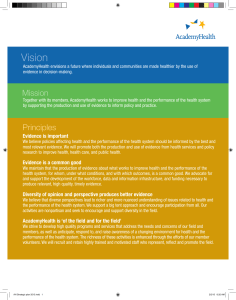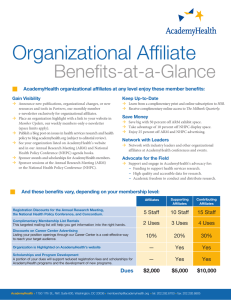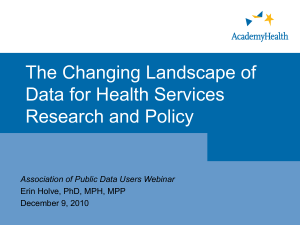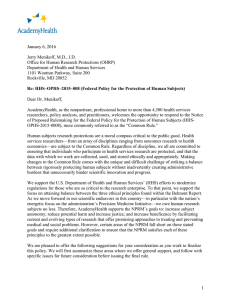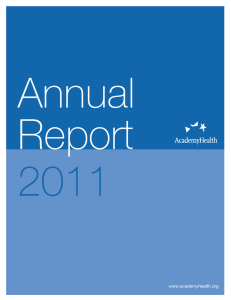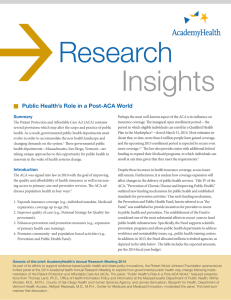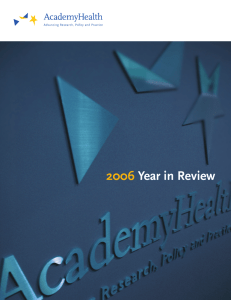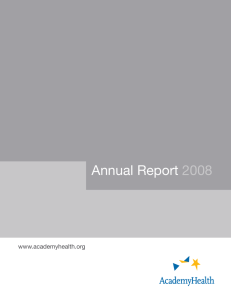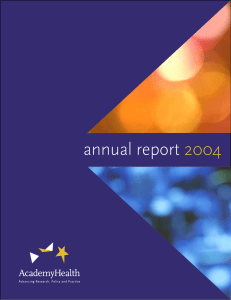Year in Review 2005 2006 year in review.indd 1
advertisement
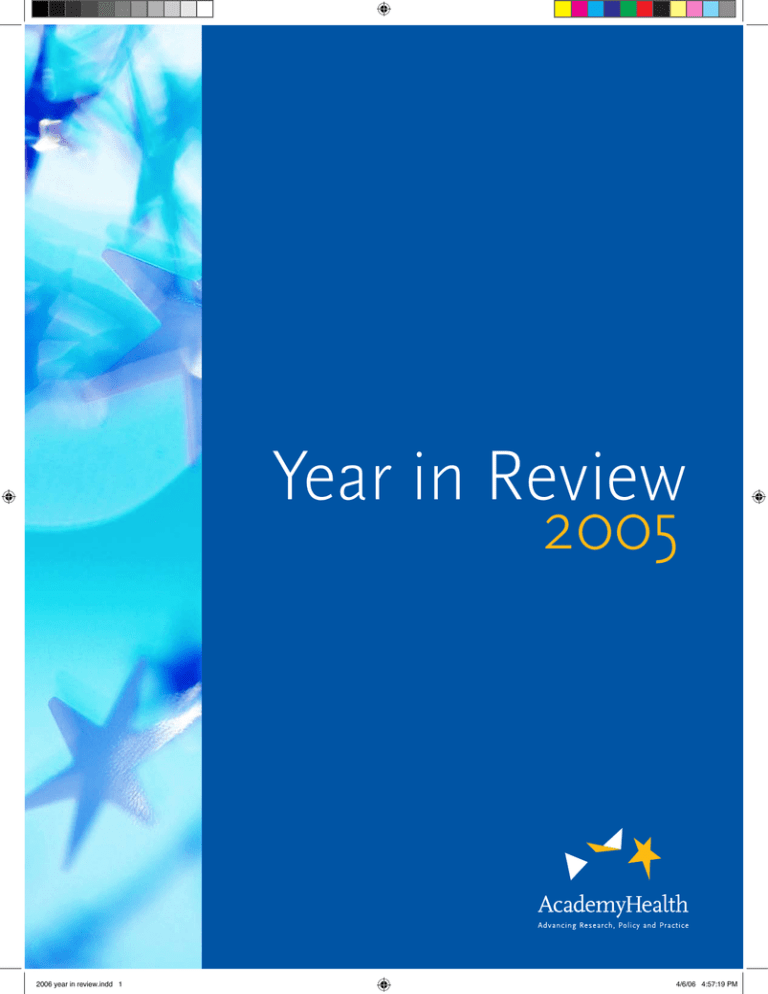
Year in Review 2005 2006 year in review.indd 1 4/6/06 4:57:19 PM Year in Review 2005 President’s Message T his report highlights the robust mix of programs and activities that comprise AcademyHealth. In summary, 2005 was exceptionally strong year for AcademyHealth as demonstrated through increased participation in our programs and our strong financial position. Our Annual Research Meeting had record-setting participation, and our Interest Groups continue to grow in size and scope. The growth in our membership and participation in our expanded program offerings are a testament to the strength and vitality of the health services research and health policy fields. The contributions our members are making to improve health policy and practice were epitomized by the new AcademyHealth HSR Impact Awards announced in December. AcademyHealth continues to be recognized by national foundations as an excellent base for important research and demonstration programs intended to advance improvements in health and health care. In addition to The Robert Wood Johnson Foundation programs on Health Care Financing and Organization and State Coverage Initiatives, The Commonwealth Fund selected AcademyHealth to be the home for their Commission on a High Performance Health System and Future of Medicare program. I want to salute the invaluable contributions being made by those who serve on the AcademyHealth and Coalition boards and committees. We greatly appreciate their participation, insight and guidance. Letters from our Board and Coalition Chairs, who guided our work in 2005, introduce this report and reflect upon the year’s achievements and opportunities for the future. Finally, the strength of AcademyHealth is also shown through the quality and commitment of its staff. This dedicated cadre is committed to advancing the health services research and health policy fields and to showcasing the many excellent contributions our members are making to advance research, policy, and practice. With the Board’s direction and support, we look forward to continuing AcademyHealth’s work to advance research, policy, and practice in collaboration with our partners. Sincerely, W. David Helms, Ph.D. President & CEO 2006 year in review.indd 2 4/6/06 4:57:19 PM Year in Review 2005 Letter from the 2005 AcademyHealth Board Chair I t has been an honor and a pleasure to serve as chair of the AcademyHealth Board of Directors in 2005. My tenure coincided with the five-year anniversary of AcademyHealth, which prompted us to take stock of the progress we’ve made and the issues that will arise as we move forward. I have been especially pleased to have been able to lead the board during the launch of a number of important initiatives, which we believe will position AcademyHealth to meet the challenges facing the health services research and policy communities. On a national policy front, a major development is the reauthorization of the Agency for Health Research and Quality. The Board’s Committee on the Placement, Coordination, and Funding of Health Services Research within the Federal Government, established in 2003, prepared a comprehensive analysis of options for the organization, as well as placement of government-sponsored comparative effectiveness research activities. The Board adopted this report, which was informed by interviews with nearly 40 leaders in health services research and policy and which has now been widely disseminated to the Administration, Members of Congress, congressional staff, and within the health services and health policy communities. When fully implemented, comparative effectiveness research will not only inform health care, but also will create new demand for health services research expertise. This new demand will, in turn, bolster the case for improving the infrastructure for the field, including greater support for graduate education, research methods, and data development. bership, a review committee considered many notable proposals and selected two research teams to receive the first award at the 2006 National Health Policy Conference in February. A description of their research has been published under the banner of AcademyHealth’s HSR Impacts series. We believe that this award will help encourage policy-relevant research and will help raise awareness of the importance of health services research to health policy and practice. Working with federal agencies and national foundations that fund health services research, AcademyHealth has also begun to explore the value of convening this group as a Council of Sponsors of Health Services Research and to develop a strategic plan or blueprint for the field. To advise this initiative, AcademyHealth staff is now conducting a series of interviews to seek input on the role of the Council and to identify infrastructure needs for the field. The Board believes that collectively, these initiatives will help lay the foundation for stronger recognition of the role of research in improving health and health care. In his keynote speech at the 2005 Annual Research Meeting in Boston, Dr. Atul Gawande stressed the critical role this field must play if we are to achieve the needed improvements in both public health and the health care system. He emphasized that “research on our health care system can save more lives in the next decade than bench science, research on the genome, stem cell research, cancer vaccine research, and everything else we hear about on the news.” It has been a pleasure to serve as your chair. A second initiative relates to the need to build a more compelling case for the role that research can play in informing health policy and practice. To underscore this need, the Board created a new award to recognize seminal research that has had a significant impact on health policy, management, or clinical practice. Following an open call for nominations from AcademyHealth mem- Sara Rosenbaum, J.D. George Washington University 2006 year in review.indd 3 4/6/06 4:57:20 PM Year in Review 2005 Letter from the 2005 Chair of the Coalition for Health Services Research W ith your help and support, the Coalition for Health Services Research—the advocacy arm of AcademyHealth—has had an encouraging 2005. Most agencies that support health services research were funded at last year’s level, but this happened in a year when many programs that did not deal with the war or disaster relief were cut or eliminated. While the Agency for Healthcare Research and Quality did not receive the budget increase we had hoped for, the Senate Appropriations Committee did include language in its funding bill recognizing the importance of investigator-initiated research and encouraging AHRQ to maximize its efforts to fund more of this critical research. Two major challenges remain for the 109th Congress. The first is the reauthorization of AHRQ. AcademyHealth has approved five recommendations for Congressional consideration regarding the placement, funding, and coordination of health services research. The Coalition is currently working hard to have these recommendations enacted as policy. As part of these efforts, we have had discussions with key congressional leaders, important Administration officials, and representatives from key stakeholder organizations, including the 135 organizations who are members of the Friends of AHRQ, and the 25 members of the Alliance for Better Health Care, which lobbies for more funding for comparative effectiveness research. In addition to AHRQ reauthorization, your Coalition leaders recognize the need to develop a new generation of champions for health services research. Many of our champions have left or soon will leave the Congress, including Senator Bill Frist (R-Tenn.), who will be retiring from the Senate after next year. Other supporters, such as Arlen Specter (R-Pa.) and Tom Harkin (D-Iowa), will remain but not indefinitely. For this reason, the Coalition leadership is working hard to identify members of the Congress who might be helpful as supporters of health services research provided that we educate them about what we do and help them to understand the importance of investing in health services research. Along with my colleagues on the Coalition Board, and with considerable help from David Helms and Jon Lawniczak, we will continue our efforts to increase awareness and interest in health services research and, hopefully, to enhance its funding. We look forward to working with the membership of AcademyHealth in support of that goal. Sincerely, David Abernethy Chair, Coalition for Health Services Research 2006 year in review.indd 4 4/6/06 4:57:21 PM Year in Review 2005 2005 Board of Directors David Abernethy (Coalition Chair) Senior Vice President, Operations HIP Health Plans Harold S. Luft, Ph.D. Caldwell B. Esselstyn Professor and Director Institute for Health Policy Studies University of California, San Francisco Margarita Alegria, Ph.D. Cambridge Health Alliance Director Nicole Lurie, M.D. Senior Natural Scientist RAND Corporation Charlie Baker, Jr. President & CEO Harvard Pilgrim Health Care Jan Malcom CEO Courage Center David Blumenthal, M.D. Director Institute for Health Policy Massachusetts General Hospital/ Partners HealthCare System David Mechanic, Ph.D. Director Institute for Health Care Policy Rutgers University Sheila P. Burke Deputy Secretary and Chief Operating Officer Smithsonian Institution Kathleen Buto Vice President, Health Policy Government Affairs Johnson & Johnson John Colmers Program Officer Milbank Memorial Fund Arnold M. Epstein, M.D. John H. Foster Professor & Chair Department of Health Policy& Management Harvard School of Public Health Nelson M. Ford Principle Deputy Assistant Secretary of the Army Financial Management, U.S. Army Jeanne Lambrew, Ph.D. Associate Professor The George Washington University Marsha Lillie-Blanton, Dr. P.H. Vice President in Health Policy The Henry J. Kaiser Family Foundation Jonathan Lomas Executive Director Canadian Health Services Research Foundation 2006 year in review.indd 5 Neil R. Powe, M.D. Professor and Director Welch Center for Prevention, Epidemiology & Clinical Research The Johns Hopkins University Robert D. Reischauer, Ph.D. President The Urban Institute Thomas Rice, Ph.D. Professor Department of Health Services University of California, Los Angeles Sara Rosenbaum, J.D. Harold & Jane Hirsh Professor of Health Policy Chair, Department of Health Policy The George Washington University Carol Weisman, Ph.D. Professor Pennsylvania State College of Medicine Gail R. Wilensky, Ph.D. Senior Fellow Project HOPE W. David Helms, Ph.D. President & CEO AcademyHealth 4/6/06 4:57:21 PM Year in Review 2005 2005 Coalition for Health Services Research Board of Directors David Abernethy (Chair) Senior Vice President, Operations HIP Health Plans Stuart Altman, Ph.D. Sol C. Chaikin Professor of National Health Brandeis University Charlie Baker (Treasurer) President & CEO Harvard Pilgrim Health Care Michael Chernew, Ph.D. Professor Dept of Health Management and Policy School of Public Health University of Michigan Charles N. Kahn, M.P.H. (Vice Chair) President Federation of American Hospitals Jeanne Lambrew, Ph.D. Associate Professor Department of Health Policy The George Washington University Sara Rosenbaum, J.D. Hirsch Professor and Chair Department of Health Policy The George Washington University Donald M. Steinwachs, Ph.D. Professor Bloomberg School of Public Health The Johns Hopkins University Reed Tuckson, M.D. Senior Vice President Department of Consumer Health/Medical UnitedHealth Group Myrl Weinberg President National Health Council Mary Woolley (Secretary) President Research!America W. David Helms, Ph.D. President & CEO AcademyHealth 2006 year in review.indd 6 4/6/06 4:57:21 PM Year in Review 2005 Coalition for Health Services Research 2004 Board of Directors About AcademyHealth A cademyHealth is the professional home for health services researchers, policy analysts, and practitioners, and a leading, non-partisan resource for the best in health research and policy. The organization promotes interaction across the health research and policy arenas by bringing together a broad spectrum of players to share their perspectives, learn from each other, and strengthen their working relationships. 2. Facilitate the use of the best available research and information by: uTranslating research findings and the lessons of experience into useful information for clinical, management, and policy decisions; uEnhancing communication and interaction between health service researchers and health policymakers; and uIdentifying areas in which additional research is needed to better inform decisions. Our Vision: AcademyHealth seeks to improve health and health care by generating new knowledge and moving knowledge into action. As the preeminent professional society for health services researchers and health policy analysts, AcademyHealth collaborates with the health services research community and other key stakeholders to: 1. Support the development of health services research by: u Expanding and improving the scientific basis of the field; uIncreasing the capabilities and skills of researchers; and uPromoting the development of the necessary data resources and financial and human infrastructure. 3. Assist health policy and practice leaders in addressing major health challenges by: uTranslating research findings and the lessons of experience into useful information for clinical, management, and policy decisions; uEnhancing communication and interaction between health service researchers and health policymakers; and uIdentifying areas in which additional research is needed to better inform decisions. AcademyHealth works to achieve its mission by offering conferences and seminars, research support, professional development programs, and knowledge transfer activities. With the active support and participation of our organizational affiliates and individual members, AcademyHealth continues its efforts to advance research, policy, and practice. 2006 year in review.indd 7 4/6/06 4:57:22 PM Year in Review 2005 Membership A cademyHealth is a membership organization with approximately 3,800 individual members and 135 organizational affiliates. Its individual members include health services researchers, public policymakers, business decision makers, policy analysts, economists, sociologists, political scientists, consultants, clinicians and students. Academic institutions, private research organizations, health providers, health plans, health systems, associations, foundations, and government agencies comprise our organizational affiliates. Membership Dues Beginning in September of 2005 , we unbundled dues and journal subscriptions, allowing members to join or renew with zero, one, or two journal subscriptions. This was in response to members’ requests for a no-journal membership rate since some members have access to our official journals through institutional subscriptions. This allowed us to hold dues rates constant at $150 for regular members and $25 for students. With this change, we have seen a 25 percent increase in the number of student memberships in 2005. Journals AcademyHealth also formalized three levels of relationships it will have with journal publishers. We continue to offer “official” status to two journals: Health Affairs and HSR. For these two journals we facilitate subscription fulfillment and collaborate on a number of projects. We also provide discounted subscriptions to members through our “coupon” program. In 2005, 32 health journals and newsletters participated in this program. New this year is the addition of a mid-level “partner” journal relationship. Partner journals include the Journal of Health Politics, Policy and Law and The Milbank Quarterly. These journals will provide a subscription discount to members through our coupon program as well as working closely together to cross-promote special issues, programs, and other activities. Interest Groups Now in their second full year of operation, AcademyHealth’s ten interest groups have continued to be very popular with nearly 3,000 individuals registered and more than 60 percent of active members joining at least one group. Each interest group held a substantive meeting in conjunction with our Annual Research Meeting, which in total attracted nearly 700 participants to interest group activities. In addition, the interest groups began to coordinate new activities such as web-based discussion forums, mentoring programs, workforce surveys, and workgroup projects. 2006 year in review.indd 8 4/6/06 4:57:22 PM Year in Review 2005 AcademyHealth Programs Through its national conferences, topical forums, skill-building workshops, and international initiatives, AcademyHealth convenes stakeholders around critical health issues, and provides professional development opportunities for researchers and policy professionals. 2005 Annual Research Meeting The AcademyHealth 2005 Annual Research Meeting (ARM), hosted in Boston for the first time, hit several all-time highs, including record attendance. In its 22nd year, the ARM continued to be the premier forum for health services research, providing opportunities to present and learn about cutting-edge research, debate health policy issues, network with colleagues, and develop new methodological skills. In addition to record attendance, there were a number of “firsts” for the Annual Research Meeting in 2005: uMore than one-third of the attendees (37 percent) were first-timers; uNearly two-thirds of the 544 speakers (63 percent) were first-time presenters; uThere was a measurable increase in the number of breakout sessions, call for papers sessions, call for panels, poster presentations, and PowerPoint presentations over previous years; uAbstract submissions soared to 1,510 (12 percent increase over 2004); and, uMore than 50 adjunct meetings were held in conjunction with the Annual Research Meeting, including 10 AcademyHealth Interest Groups. The 2006 Annual Research Meeting will be held in Seattle on June 25-27. Seminars in Health Services Research Methods AcademyHealth offers both 90-minute methods workshops and full-day methods seminars at its Annual Research Meeting. In 2005, the five full-day methods seminars were: uAdvances in Methods for Monitoring Health Outcomes, taught by John Ware, Jr., QualityMetric, Inc. uIntroduction to Hierarchical Modeling for Health Services Research, taught by Sharon-Lise Normand, Harvard School of Public Helath, and Alan Zaslavsky, Harvard Medical School 2006 year in review.indd 9 uThe Why & How of Risk Adjustment, taught by Arlene Ash, Boston University School of Medicine, and Michael Shwartz, Boston University School of Management uEnhancing Your Methodological Toolbox: An Introduction to Qualitative Research, taught by Shoshanna Sofaer, Baruch College; Kelly Devers, Virginia Commonwealth University; and Kristin Carman, American Institutes for Research uThe Healthcare Cost & Utilization Project (HCUP): Data & Tools for Health Services Research & Policy Analysis, taught by Claudia Steiner, Jenny Schnaier, and Herbert Wong, all from AHRQ A total of 200 students participated in the full-day methods seminars. 2005 AcademyHealth Award Winners Each year, AcademyHealth honors health services research and health policy leaders with several prestigious awards, which were presented during the 2005 Annual Research Meeting in Boston. Distinguished Investigator Award Linda H. Aiken, Ph.D., is director of the Center for Health Outcomes and Policy Research, The Claire M. Fagin Leadership Professor of Nursing, professor of sociology, and senior fellow at the Leonard Davis Institute of Health Economics at the University of Pennsylvania. Alice S. Hersh New Investigator Award Katrina Armstrong, M.D., M.S.C.E., is an assistant professor of medicine and epidemiology, senior fellow and director of research at the Leonard Davis Institute of Health Economics, and senior scholar in the Center for Clinical Epidemiology and Biostatistics at the University of Pennsylvania. She is also the program leader of the Cancer Control and Outcomes Program at the Abramson Cancer Center. Article-of-the-Year Award Anthony T. LoSasso, Ph.D., received this award for his lead authorship on “The effect of the state children’s health insurance program on health insurance coverage,” which appeared in the September 2004 issue of the Journal of Health Economics. 4/6/06 4:57:23 PM Year in Review 2005 This article is co-authored by Thomas Buchmueller, Ph.D., University of California, Irvine. Dissertation Award Rachel M. Werner, M.D., Ph.D., is an assistant professor of medicine at the University of Pennsylvania and a staff physician at the Philadelphia VA Medical Center. 2005 National Health Policy Conference The National Health Policy Conference (NHPC), co-hosted by AcademyHealth and Health Affairs, provides approximately 700 participants with a health policy preview of the year ahead, as experts from the administration, academia, and the health industry share insights on critical health care issues. The 2005 NHPC was held in Washington, DC, on February 2-3, and marked the fifth anniversary of this national event. The conference was held soon after President Bush won the election for a second term and was organized around the theme: “Post Election 2004: What’s in Store for Health Policy.” Sessions focused on consumer-driven health plans, Medicare coverage, malpractice reform, prescription drug discount cards, and the congressional health policy agenda. Health Policy Tools & Techniques For the second year, AcademyHealth offered two, three-hour minicourses on Health Policy Tools & Techniques in conjunction with the National Health Policy Conference. The 2005 minicourses were “Health Policy by Numbers: Understanding Federal Cost Estimates,” taught by Kenneth E. Thorpe, Ph.d. and “Risk Adjustment & Health Policy: Everything You Ever Wanted to Know,” taught by David Knutson. The purpose of the minicourses is to provide professional development opportunities for health policy professionals, just as AcademyHealth offers a variety of Seminars in Health Services Research Methods for its researcher members. The minicourses have been at capacity during each of the two years they have been offered. Because of this strong demand, two new courses will be offered in conjunction with the 2006 NHPC. www.academyhealth.org/nhpc/index.htm Policymaking in Washington: The 2005 Health Policy Orientation a highly regarded program that provides a behind the scenes look at policymaking in Washington. With a one-to-one ratio of faculty to participants, the orientation offers an in-depth understanding of formal and informal policymaking processes and the players who shape health policy. In each of the past two years, the Orientation was at capacity with 50 participants, including public officials, federal or state government employees, private sector health care employees, including health policy fellows, consultants, and analysts. www.academyhealth.org/orientation The International Exchange for Health Services Research and Policy The exchange provides opportunities for U.S. researchers and policymakers to learn from health policy developments abroad. AcademyHealth works with a broad range of partners on activities that include: comparative health services research and policy analysis, educational programs, and bilateral and multilateral expert meetings and conferences. This year, the Rockefeller Foundation and other sponsors supported nine country case studies and an expert meeting on nurse migration, which was held in Bellagio, Italy in July. The fall issue of Health Care Financing Review reported on our November 2004 German-US conference on care coordination. Plans are under way for a March 2006 meeting with Mexico on Type 2 Diabetes among indigenous groups. The Mexico meeting will be sponsored by Assistant Secretary for Planning and Evaluation and supported through the AHRQ-KT contract. www.academyhealth.org/international Health in Foreign Policy Forum As more health policy challenges extend across borders, there is growing recognition that countries can no longer ensure the health of their citizens through national policies alone. The forum facilitates inter-disciplinary dialogue between health and foreign policy experts on issues that require an international perspective. The inaugural Forum in 2005 focused on the nexus between the health and foreign policy fields; the 2006 Forum will focus on Migration and the Global Shortage of Health Workers. www.academyhealth.org/nhpc/foreignpolicy/ This three-and-a-half day program, which is hosted by AcademyHealth with partial support from the National Center for Health Statistics, has become 10 2006 year in review.indd 10 4/6/06 4:57:23 PM Year in Review 2005 Sponsored Programs and Contracts I n addition to developing its own programs, AcademyHealth serves as the home for foundation programs and as a contractor to the federal government for a number of important initiatives. These programs sponsor research and demonstration projects, provide technical assistance, and disseminate research to public and private decision makers. changes to help meet such targets. The Commission meets three times per year, with a number of active workgroups meeting intermittently, and supports annual Congressional and Congressional staff retreats, as well as an annual set of policy issue briefs and series of briefings on Capitol Hill. Program on Medicare’s Future The Robert Wood Johnson Foundation The Commonwealth Fund This program aims to enhance Medicare’s capacity to be an innovative leader in coverage, quality improvement, and value by evaluating policy options and practices for achieving better access, improved quality, and greater efficiency for Medicare beneficiaries—particularly the most vulnerable ones—and for the health care system overall. During the past year, the program has examined issues such as the implementation of the new prescription drug benefit and its effect on the accessibility, quality, and cost of the medication beneficiaries need, as well as the role of private plans in Medicare. The program has also supported efforts to protect vulnerable beneficiaries and to improve the quality, effectiveness, and coordination of care provided to beneficiaries. Commission on a High Performance Health System The Commonwealth Fund The Commission, which was launched in June 2005, aims to move the United States toward a highperforming health care system that achieves better access, improved quality, and greater efficiency, focusing on the most vulnerable populations. The 18 Commission members represent a full spectrum of health system perspectives, as well as a commitment to all elements of a high performing system. The Commission is charged with identifying the characteristics of a high performance health system and public and private policies and practices that would lead to health system improvements; exploring mechanisms for financing improved health insurance coverage as well as investment in the nation’s capacity for quality improvement; setting realistic targets for what the U.S. could achieve and tracking change over time; and identifying and analyzing policy and practice 2006 year in review.indd 11 Changes in Health Care Financing and Organization Program (HCFO) AcademyHealth is the national program office for the HCFO program, an investigator-initiated grants program that supports research and policy analysis, evaluation, and demonstration projects examining major changes in health care financing and their effects on cost, access, and quality. HCFO brings together the policy and research communities by convening meetings, translating research, and disseminating findings. As a multifaceted initiative working to provide timely information to policy makers, HCFO periodically issues special topic solicitations, which are designed to elicit projects focused on a certain area of interest. In 2005, HCFO fielded three special solicitations; one, co-sponsored with the Commonwealth Fund, called for proposals examining the administrative complexities of today’s health insurance practices and payment systems; a second called for proposals examining the use of consumer information in the new consumer centric paradigm; and, the final solicitation sought proposals addressing the financing and organization of the current public health system. The solicitations drew a strong response from a wide variety of researchers representing multiple disciplines. www.hcfo.net State Coverage Initiatives Program (SCI) The Robert Wood Johnson Foundation AcademyHealth serves as the National Program office for the SCI program, which provides technical assistance to state policymakers’ efforts to maintain and expand health insurance coverage. SCI convenes national and regional workshops, publishes in-depth analysis of state coverage strategies, and offers tools and resources to state officials. 11 4/6/06 4:57:23 PM Year in Review 2005 In 2005, SCI added new resources to its Web site, www.statecoverage.net, to better help states navigate options for expanding health insurance coverage. One of the most significant improvements is the state coverage matrix, which provides at-a-glance comparisons and in-depth descriptions of coverage strategies, such as Medicaid and State Children’s Health Insurance Program waivers, reinsurance, high-risk pools, limitedbenefit plans, and group purchasing arrangements. Also included in the matrix are coverage profiles of each state, as well descriptions of strategies that states have implemented to expand or sustain coverage. www.statecoverage.net Knowledge Transfer Initiative Agency for Healthcare Research and Quality Under contract with AHRQ, AcademyHealth develops and implements long-range strategies to assist health care purchasers, health systems leaders, and state and local policymakers in applying researchbased evidence to policy and program development. In 2005, AcademyHealth helped AHRQ launch two national learning networks: The Medicaid Medical Directors’ Learning Network is designed to assist these clinical leaders in identifying and applying the latest research findings and related information to address high priority policy and program issues, especially related to quality assurance, quality improvement, and coverage decisions. And, the Pilot Learning Network on Quality-Based Purchasing is intended to support a select group of employer coalitions and State Medicaid agencies, that are planning to implement a quality-based payment scheme or public report card programs. Through this contracting vehicle, AcademyHealth has also developed projects with other AHRQ divisions and HHS agencies, including a project on Economic Evaluation of Disease Management, an Environmental Scan of State Quality Initiatives, an Evidenced Based Disability and Disease Management Workshop and Toolkit for AoA and a Bilateral U.S.-Mexico Meeting on Type 2 Diabetes Among Indigenous Populations from ASPE. State Planning Grant Program Health Resources and Services Administration (HRSA) AcademyHealth provides technical assistance to HRSA State Planning Grantees that includes on-site consultation with key grant staff and stakeholders, as well as national forums for state officials to share strategies for maintaining and expanding coverage. In 2005, HRSA increased the number of pilot states from nine to 18. However, this is the last year of the program, and all the grants awarded in 2005 will conclude by 2007. www.statecoverage.net/hrsa.htm Health Services Research Projects in Progress (HSRProj) National Library of Medicine HSRProj is a unique database that provides information about health services research grants and contracts that are still in progress. As the National Library of Medicines (NLM) contractor, AcademyHealth and its subcontractor, the University of North Carolina Chapel Hill, Cecil G. Sheps Center for Health Services Research, have been successfully managing HSRProj since its inception in 1993. In 2005, the project grew in a number of ways: uExpanded the HSRProj database and recruited three new participating organizations; uSubmitted a Research Report to NLM examining the influence of health technology on prescribing and medication errors; uAssisted NLM in identifying unmet information needs among the health services research community through AcademyHealth’s network of members, contacts, and technical advisors; uSubmitted a solicitation plan to NLM targeting new user audiences and venues to promote HSRProj, developed promotional material and conducted outreach in nine venues; and, uReceived approval from NLM to develop and disseminate two user prototypes highlighting how HSRProj serves as a tool for researchers and policymakers. More information is available at www.academyhealth.org/hsrproj. 12 2006 year in review.indd 12 4/6/06 4:57:24 PM Year in Review 2005 Advocacy through the Coalition for Health Services Research I n 2005, the Coalition for Health Services Research – the advocacy arm of AcademyHealth – focused on expanding our networks of supporters to advocate for increased funding for health services research. Our advocacy efforts focused on ensuring that Congress continues to value the following agencies that support health services research and data. 4) Establish Council of Sponsors to bring together the public and private funders of health services research to provide increased public-private coordination, undertake an overall assessment of the field, and develop a plan to more effectively utilize the resources provided to health services research; and 5) Increase overall funding of health services research from $1.5 billion to $5 billion. uAgency Using the AcademyHealth report as its guide, the Coalition developed and began implementing a strategy to ensure that the needs of the field are met when Congress reauthorizes the Agency for Healthcare Research and Quality (AHRQ). Our advocacy is focused on insuring that mechanisms are adopted to provide insulation to the agency conducing comparative effectiveness research; increasing coordination throughout the federal government and with the private sector; and expanding the infrastructure that supports health services research. To strengthen the infrastructure for health services research, the Coalition is f0cusing primarily on obtaining more funding for graduate students and early career professionals, for investigator-initiated research and a broader range of targeted solicitations, and for improving applied research methods and health data sets. To achieve our overall goals for the field, AcademyHealth has established the long term goal of increasing funding by the federal government for health services research and health data from $1.5 billion to $5 billion. for Healthcare Research and Quality, to focus on a broader range of research topics, including comparative effectiveness research; uCenters for Disease Control and Prevention, in support of public health research; uCenters for Medicare and Medicaid Services, to have an independent research capacity; uNational Centers for Health Statistics, to ensure researchers have access to important data; uNational Institutes of Health, to increase the funding allocated to health services research; and uVeterans Health Administration, to support the critical role health services research plays at the Veterans Administration. This year, in addition to advocating for those agencies that fund health services research, the Coalition’s efforts included advocating in support of the AcademyHealth report on the Placement, Coordination, and Funding of Health Services Research within the Federal Government. (www.chsr.org/placementreport.pdf). This report makes the following five recommendations: 1) AHRQ should remain the lead agency for health services research; 2) Comparative effectiveness research should be conducted within AHRQ and structured in such a way as to provide greater insulation for the entity that makes these findings; 3) Increase coordination of health services research throughout the federal government; The Coalition needs your help in all these advocacy initiatives. Delegations of members and other advocates from states who have key legislators in the appropriations process have been enormously influential, as have those who have been responsive to our requests to contact their members of Congress. For more information, go to www.chsr.org. 1 The AcademyHealth report also allows for comparative effectiveness research to be undertaken by either an entity separate from AHRQ, or through the creation of a quasi-governmental entity. Determining that Congress was highly unlikely to provide a huge increase in expenditures for this function, the Coalition for Health Services Research decided to focus its advocacy efforts on improving the comparative effectiveness structure within AHRQ. 13 2006 year in review.indd 13 4/6/06 4:57:24 PM Year in Review 2005 2005 Funders and Supporters Federal Government Pharmaceutical Industry Agency for Healthcare Research and Quality Centers for Disease Control and Prevention National Center for Health Statistics Centers for Medicare & Medicaid Services Health Resources and Services Administration Maternal and Child Health Bureau National Institutes of Health National Cancer Institute National Institute on Alcohol Abuse and Alcoholism National Institute on Drug Abuse National Institute of Mental Health Office of the Assistant Secretary for Planning and Evaluation Substance Abuse and Mental Health Services Administration Department of Veterans Affairs Health Services Research & Development Service Eli Lily & Company Johnson & Johnson Merck and Company National Pharmaceutical Council Novartis Pfizer Foundations American Legacy Foundation California HealthCare Foundation Canadian Health Services Research Foundation The California Wellness Foundation The Commonwealth Fund The Henry J. Kaiser Family Foundation Kansas Health Foundation The Milbank Fund Nemours The Robert Wood Johnson Foundation The Rockefeller Foundation UnitedHealth Foundation Health Care Payers & Providers Federation of American Hospitals Harvard Pilgrim Health Care Kaiser Permanente Mayo Clinic, Division of Health Care Policy & Research Associations AARP American Medical Association American Academy of Pediatrics (AAP) American Osteopathic Association Association of American Medical Colleges AUPHA Biotechnology Industry Organization National Association of Children’s Hospitals and Related Institutions National Health Council Universities University of California, Berkeley Center for Health Research University of California, San Francisco Institute for Health Policy Studies, School of Medicine George Washington University Department of Health Policy School of Public Health and Health Services John Hopkins Bloomberg School of Public Health, Department of Health Policy and Management Other Abt and Associates, Inc. Center for Studying Health System Change Georgia Health Policy Center International Development Research Centre Joint Center for Political and Economic Studies The Lewin Group Pan American Health Organization Park Nicollet Institute Polidais, LLC Project Hope RAND Health 14 2006 year in review.indd 14 4/6/06 4:57:24 PM
